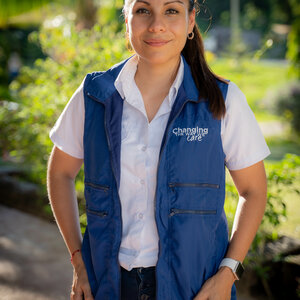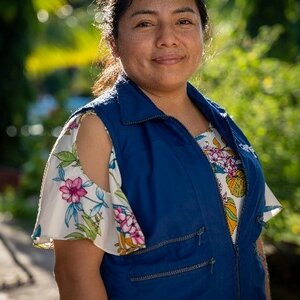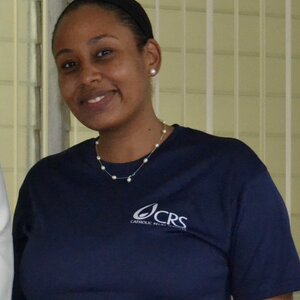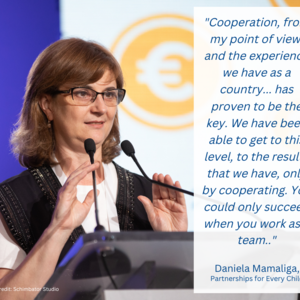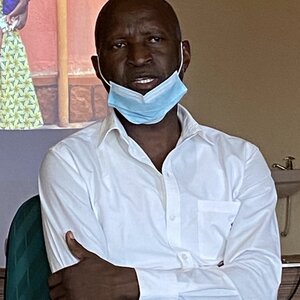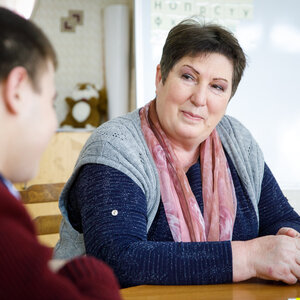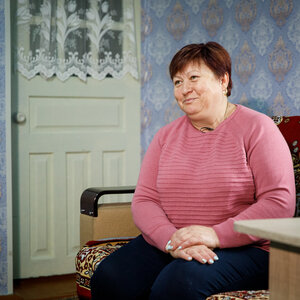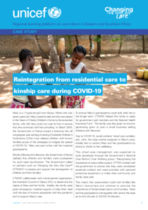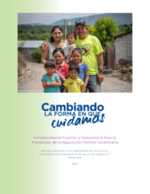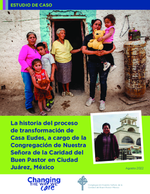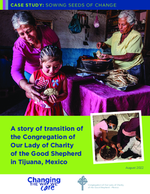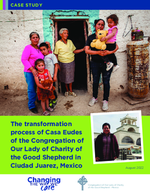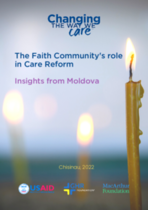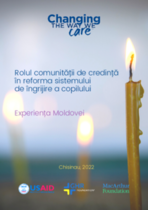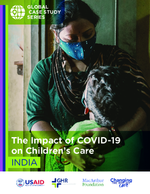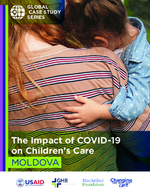Changing The Way We Care℠ (CTWWC) is an initiative designed to promote safe, nurturing family care for children: those reunifying from residential care facilities (also known as “orphanages”) or those at risk of child-family separation. This includes strengthening families and reforming national systems of care for children, including family reunification and reintegration, and development of alternative family-based care. CTWWC envisions a world where all children thrive in safe and nurturing families. CTWWC is implemented by Catholic Relief Services and Maestral International, along with other global, national and local partners working together to change the way we care for children around the world. Our principal global partners are the Better Care Network and Faith to Action. CTWWC is funded in part by a Global Development Alliance of USAID and the GHR Foundation.
Contact this organization about:
Organization Size
Headquarters Location
Baltimore, MD
United States
Organization Type
Main Areas of Work
Resources by Theme
CTWWC Kenya
CTWWC Kenya works with the Kenyan government’s Department of Children’s Services, National Council of Children’s Services, county governments and many non-government partners to improve children’s care in Kenya. Key work includes: a national Case Management Package for Reintegration, Alternative Family Care SOPs and Training Package, national gatekeeping guidelines, disability inclusion training, supporting the National Care Reform Strategy development, parenting curriculum and training, etc.
Together with local partners, CTWWC Kenya is strengthening systems, communities and families, strengthening caregivers and families with parenting, economic strengthening and access to services. CTWWC Kenya partners with the Kenyan Society of Care Leavers (KESCA) and other care leaver networks and individuals to ensure their voices are elevated and children/youth leaving care can participate in decisions affecting them. KESCA and CTWWC Kenya have developed a life skills programming and published the Engaging Care Leavers Guidance and Meaningful Engagement Series.
CTWWC Kenya works with many others to change community attitudes and practices in support of family care, working closely with networks and faith communities such as the Coast Interfaith Council of Clerics, the Association of Sisterhoods Kenya, the Association of Alternative Care Organizations, etc.
CTWWC Kenya supports organizations and charitable children's institutions to transform their services by supporting case management for reintegration, strategic organizational development, and more.
CTWWC Kenya has contributed to research and evidence on care in Kenya including situation analysis, COVID impact and a care system assessment - all available on BCN and highlighted in the BCN Newsletter March 2021.
CTWWC Kenya shares learning through regional events and opportunities such as via the network of Catholic Relief Services offices in the region, the UNICEF/CTWWC supported East and Southern Africa Regional Learning Platform, REPSSI and other regional conferences, and various webinars and trainings.
CTWWC India
CTWWC India focuses on preventing the separation of children from their families and their institutionalization, using a family strengthening approach of case management, parenting skills, household economic strengthening and connection to services. CTWWC India works to:
Help state government to establish and roll out case management systems and standard operating procedures for family strengtheng, prevention of separation and reunification/reintegration of children from children's care institutions, including adaptations for the COVID context like virtual case monitoring
Establish and strengthen community-level groups that make decisions about children’s care by setting up Village Child Protection Committees (VCPCs). VCPCs are community groups made up of service providers, community leaders and families who identify, plan, and act upon child protection risks in their villages.
Create awareness campaigns on the harmful impact of child separation and institutionalization, particularly with community actors and with the Catholic Church actors. CTWWC India works with residential care facilities to transition to family support centers - with a focus on Odisha and Tamil Nadu States.
Support local authorities and partners in developing a care reform strategy that includes preventing child separation and institutionalization, taking into consideration the Covid-19 context
Promote family strengthening of at-risk families in collaboration with local district child protection providers. At the national level CTWWC India works with the India Alternative Care Network and UNICEF to influence national policy and practice and conducts research into topics such as public finance and children's care. CTWWC India developed a compilation toolkit on emerging practices in care reform.
CTWWC Moldova
CTWWC Moldova launched in 2019 and is building a collective effort for the continued care reform in Moldova by mobilizing government and community leaders, organizations and families to plan key interventions together. CTWWC Moldova is working closely with and under the new National Programme for Child Protection. CTWWC partners with experienced care reform organizations, government, faith actors, and community based organizations. Government and civil society partners are working together to support the remaining children in residential institutions to reintegrate with families and communities. Partners are also strengthening social services for reunified families, improving case management systems, training workers, and working with local authorities and community organizations to strengthen families.
CTWWC Moldova has completed research which is available on BCN and provides an update on the situation of children and families, social service workers, services, etc. in the country.
CTWWC Moldova focuses on: reunifying children remaining in residential institutions with families, strengthening systems of support to prevent family-child separation, providing expertise to strengthen national care strategies including improvements in the social workforce and case management practices, accessibility and quality of the family, community, and support services available for children and families, advancing public policies and making the case for adjusting public finance to fund community services, engaging faith and community actors to influence public opinion on the above activities, and transforming residential care models to family support services and/or redirecting resources from residential to family care.
CTWWC Guatemala
CTWWC Guatemala helps children currently living in residential care facilities (referred to as protection homes in Guatemala). The initiative does this through: reforming the care system at the national level, strengthening families and commmunities, and advocacy and awareness efforts.
CTWWC Guatemala works at the national level with the four responsible government institutions to build programs and services for children and families including prevention of separation/ family strengthening, case management for reintegration, family-based alternative care, and more. CTWWC Guatemala connects families with community support and existing social services and ensures children are cared for in safe and nurturing families and has adapted to emergency response under COVID.
CTWWC Guatemala trains government staff charged with child protection and care, mentors workers to provide quality case management, conducts research to inform national care reform policy and practice, analyzes state budgets and provides cost comparisons to advocate for family care. CTWWC Guatemala works closely with government and nongovernment partners to prevent unnecessary family separation and promote support services for families, expand family-based alternative care such as kinship care and temporary foster care, ensure children's quality care as related to migration, planned reunification of children from residential care into family-based care, transition or transformation of residential care models (protection homes) to community and family services.
CTWWC Guatemala makes learning from the work in the country available to other countries and organizations via webinars, training and exchanges.
CTWWC Haiti
CTWWC Haiti focuses on preventing the separation of children from their families by building the capacity of community child protection committees, and strengthening families with parenting skills training and economic strengthening. Case management for reunification and reintegration has supported children with disabilities to return to family care - with birth parents, kin and, in some cases, foster families.
CTWWC Haiti works in partnership with community organizations, Catholic Church partners, residential care facilities and community leaders. In response to emergencies, COVID and natural disasters, CTWWC Haiti connects with Catholic Relief Services (CRS) long history with emergency response.
CTWWC Haiti works with Catholic residential care facilities to reunify children and transition to community support services. This experience includes services for children with disabilities. CRS Haiti is a partner to an anti-trafficking initiative in the country, which includes raising awareness around the connection of residential care with trafficking and helping to build capacity for reunification.
Organization Resources
This case study documents the story of Mary, one of thousands of children in Kenya who were sent to family care suddenly without any preparation when the COVID-19 pandemic hit. Mary's story highlights the need for family assistance to see a reunification through to successful reintegration.
Este documento se basa en la experiencia de Cambiando la Forma en Que Cuidamos (o sus siglas en inglés, CTWWC) Guatemala en procesos de fortalecimiento familiar y comunitario en un área específica de intervención.
Este estudio de caso destaca la transición de servicios de cuidado residencial a los basados en la familia y comunidad las realizado por las Hermanas de Nuestra Señora de la Caridad del Buen Pastor, en Ciudad Juárez, México.
This case study highlights the transition of the Sisters of Our Lady of Charity of the Good Shepherd in Tijuana. It presents the highs and lows that come with a change process of moving from residential care to community-based services focused on family strengthening.
This case study highlights the transition of the Sisters of Our Lady of Charity of the Good Shepherd in Ciudad Juarez. It is an honest look at the emotional, logistical, and practical elements involved in transitioning from a residential care model which existed for more than 100 years to a provider of community-based and family-centered services.
This report details Changing the Way We Care's enquiry into the faith-based community in Moldova and its involvement in the ongoing reform of care for vulnerable children.
În primăvara anului 2021, programul Changing the Way We Care (CTWWC) a lansat un sondaj pentru a studia comunitatea de credință din Moldova și implicarea acesteia în reforma sistemului de îngrijire a copiilor. Scopul acestui sondaj a fost de a înțelege mai bine angajamentul actual și potențial al organizațiilor și liderilor de credință în calitate de persoane de influență și furnizori de servicii, dar și de a identifica orice obstacole în calea implicării acestora în reforma respectivă.
This is the monthly update of the Eastern and Southern Africa Regional Learning Platform published in October 2022.
This case study is part of a series of case studies conducted in India, Kenya, Moldova and Uganda over the course of 2020-2022 to share information on how COVID-19 has and is affecting family-child reunification, alternative care placement, and offers recommendations for family- and community-based care of vulnerable children in the context of COVID-19 and future emergencies.
This case study is part of a series of case studies conducted in India, Kenya, Moldova and Uganda over the course of 2020-2022 to share information on how COVID-19 has and is affecting family-child reunification, alternative care placement, and offers recommendations for family- and community-based care of vulnerable children in the context of COVID-19 and future emergencies.


